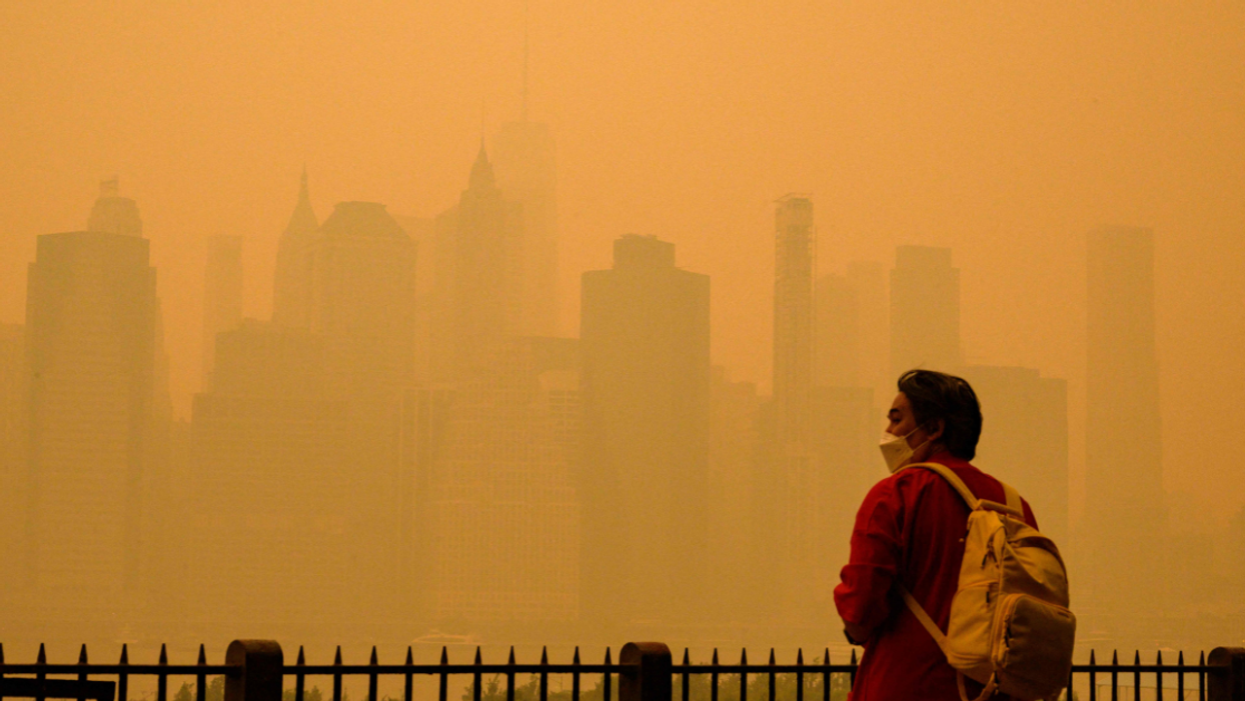Millions of North Americans are under air quality advisories as wildfires burning across Canada caused evacuations, disrupted air travel and lead to smoke-filled skies thousands of miles away.
The United States National Weather Service extended air quality alerts Thursday on the East Coast from central Maine to South Carolina and parts of the Midwest.
More than 400 Canadian wildfires were still burning az of Thursday. The province of Quebec alone has approximately 150 fires.
Cities such as New York and Philadelphia have dangerously low air quality as a result of the smoke.
People have been keeping a close eye on air quality updates.
The city of New York had the worst air quality of any major city in the world Wednesday.
But large swaths of Eastern Canada and upstate New York were even worse.
A tweet from Colin McCarthy—@US_Stormwatch—describing the effects of the air pollution really caught the internet's attention.
Some were dubious of McCarthy's assertion, but the cigarette comparison didn't come out of nowhere.
Stanford Woods Institute for the Environment talked about Air Quality Index (AQI) and the comparison to cigarettes smoked in a 2020 article.
In their article, Dr. Kari Nadeau said:
"An AQI measurement of 20 is equivalent to smoking one cigarette a day."
"Communities exposed to wildfire smoke causing AQI of 150 for several days is equivalent to about seven cigarettes a day if someone were outside the whole time."
"Even if you’re indoors, you could be breathing in this poor air quality due to leakage."
As for the reason cigarettes are being used as a comparison, the article stated:
"Cigarette smoke is the best analogy researchers have right now but more research is being done to account for toxins in the air caused by wildfires that may go beyond the dangers of cigarettes."
Cigarettes and their dangers are also something that is ffairly familiar to the general population, likely leading to how quickly McCarthy's tweet spread.
Many people shared how the smoke was affecting their area.
There were a lot of solidarity posts from people on the West Coast of North America—where wildfires and the resulting smoke have become almost commonplace.
If you live in an area being affected by the smoke, the Environmental Protection Agency has some tips to help you deal with it:
- Keep your windows and doors closed as much as possible.
- Reduce the smoke that enters your home by setting your HVAC system to recirculate mode or close the outdoor fresh air intake damper.
- If you have a window unit air conditioner, also close the fresh air intake damper.
- Use an air purifier to help filter the smoke.
You can create a DIY air cleaner with a 20-inch box fan and a 20-inch furnace filter (you'll want one with a MERV rating of 11-14). You can find instructions on how to make that DIY filter below, provided by The Washington Department of Ecology and Confederated Tribes of the Colville Reservation.
If you have any N95 masks or respirators already because of the pandemic, they will significantly help filter out the smoke particles if you have to leave the house.
It is best to limit outdoor time as much as possible though.
You can find a full list of tips and recommendations for dealing with wildfire smoke on the EPA's website, HERE.








 Roberto Schmidt/AFP via Getty Images
Roberto Schmidt/AFP via Getty Images





 u/pizzaratsfriend/Reddit
u/pizzaratsfriend/Reddit u/Flat_Valuable650/Reddit
u/Flat_Valuable650/Reddit u/ReadyCauliflower8/Reddit
u/ReadyCauliflower8/Reddit u/RealBettyWhite69/Reddit
u/RealBettyWhite69/Reddit u/invisibleshadowalker/Reddit
u/invisibleshadowalker/Reddit u/Wishnik6502/Reddit
u/Wishnik6502/Reddit u/kateastrophic/Reddit
u/kateastrophic/Reddit u/blking/Reddit
u/blking/Reddit u/SlagQueen/Reddit
u/SlagQueen/Reddit u/geezeslice333/Reddit
u/geezeslice333/Reddit u/meertaoxo/Reddit
u/meertaoxo/Reddit u/crystal_clear24/Reddit
u/crystal_clear24/Reddit u/stinkpot_jamjar/Reddit
u/stinkpot_jamjar/Reddit
 u/Bulgingpants/Reddit
u/Bulgingpants/Reddit
 @hackedliving/TikTok
@hackedliving/TikTok @hackedliving/TikTok
@hackedliving/TikTok @hackedliving/TikTok
@hackedliving/TikTok @hackedliving/TikTok
@hackedliving/TikTok @hackedliving/TikTok
@hackedliving/TikTok @hackedliving/TikTok
@hackedliving/TikTok @hackedliving/TikTok
@hackedliving/TikTok @hackedliving/TikTok
@hackedliving/TikTok @hackedliving/TikTok
@hackedliving/TikTok @hackedliving/TikTok
@hackedliving/TikTok
 @vanderjames/Instagram
@vanderjames/Instagram @vanderjames/Instagram
@vanderjames/Instagram @vanderjames/Instagram
@vanderjames/Instagram @vanderjames/Instagram
@vanderjames/Instagram @vanderjames/Instagram
@vanderjames/Instagram @vanderjames/Instagram
@vanderjames/Instagram @vanderjames/Instagram
@vanderjames/Instagram @vanderjames/Instagram
@vanderjames/Instagram @vanderjames/Instagram
@vanderjames/Instagram @vanderjames/Instagram
@vanderjames/Instagram